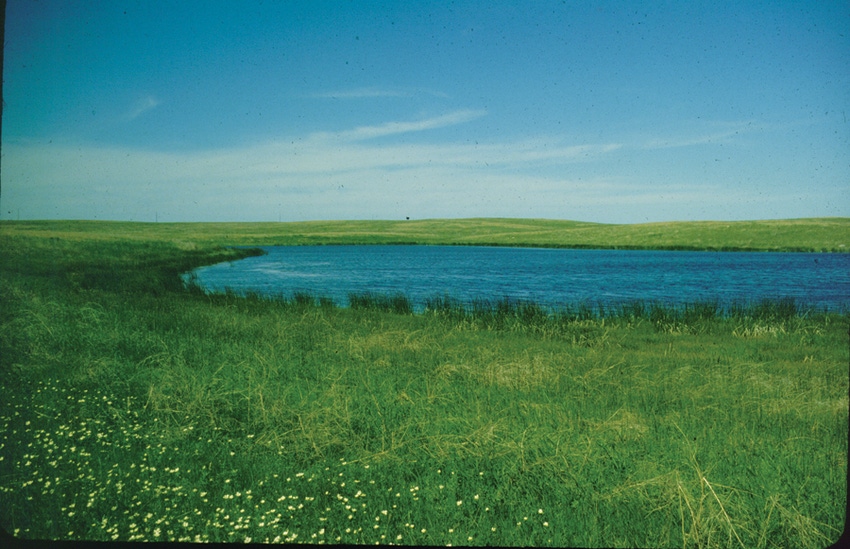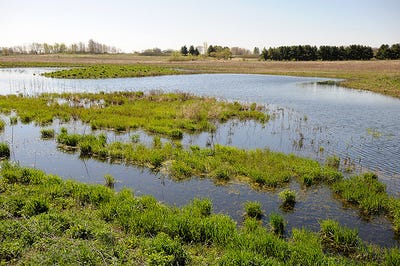
EPA/Corps/NRCS alliance spells trouble for farmers, Rep. Crawford says
Proposed changes to the Clean Water Act and the Endangered Species Act, if adopted, "will have huge negative impact on U.S. farmers' ability to produce the cheapest, safest, most abundant food supply in the world," says Arkansas Rep. Rick Crawford, who spoke at the annual conference of the Southern Peanut Farmers Federation.

A “regulatory triad” composed of the Environmental Protection Agency, the U.S. Corps of Engineers, and USDA’s Natural Resources Conservation Service holds the potential for a lot of headaches for agriculture, says Republican Rep. Rick Crawford, who represents Arkansas’ first district.

ARKANSAS CONGRESSMAN Rick Crawford, right, visits with Greg Grimsley, center, Birdsong Peanuts, and Scott Emerson, The Peanut Grower. Grimsley also is president of Peanut Proud, a peanut industry charitable and humanitarian organization that sponsors scholarships and provides peanuts/peanut products for domestic and international hunger relief, as well as emergency/disaster relief.
At the heart of the problem, he said at the annual conference of the Southern Peanut Farmers Federation, are proposed changes to the Clean Water Act and the Endangered Species Act. “Both, if adopted, will have huge negative impact on your ability to produce the cheapest, safest, most abundant food supply in the world,” he said.
He says he is “advocating strongly” for a bill that “would, hopefully, restrain the Endangered Species Act and make it more workable.” While environmental activists work to hamper U.S. farmers, he says, “I contend that farmers are active environmentalists — you’re out there every day, implementing conservation and environmental practices as a part of your operations. You derive your income from the land — it’s in your best interest to be active environmentalists, to be conservationists.
NEWS THAT'S IMPORTANT TO YOU, delivered daily to your inbox: Subscribe to Delta Farm Press Daily
“When an environmental activist points to your farm and says you’re not doing this or that right, you have every reason and every right to bristle at the notion that somebody from the west coast or somewhere else can come onto your farm area and say, ‘We don’t think you’re a good enough conservationist and environmentalist — this is how it should be done, and we’re going to restrict the way you’ve always done it.’ I’ve got a problem with that.”
Critical habitat expansion
The designation of critical habitat under the Endangered Species Act is expanding, Crawford says. “Folks out west have dealt with the ESA for years, and now it’s coming soon to an area near you. In Arkansas, we’ve seen an attempted expansion of critical habitat designation that will affect 41 percent of the state, that will essentially create buffers that will shut down a lot of economic activity and farming activity.

In Arkansas, says Rep. Rick Crawford, "We’ve seen an attempted expansion of critical habitat designation that will affect 41 percent of the state, that will essentially create buffers that will shut down a lot of economic activity and farming activity." —USDA photo
“And we don’t even know the full economic impact. [Agency representatives] admitted in a committee hearing that they don’t do economic impact surveys to determine whether or not it’s in the interest of the people to expand a critical habitat designation. This is the kind of thing we’re up against.”
The Waters of the U.S. proposed rule spells big time trouble, Crawford says. “If this isn’t on your radar screen, it should be. We all want clean water — the idea that you, as farmers, don’t want clean water is not a debate we should even be having. When you water your crops and you turn water back into a waterway that’s cleaner and more pristine than the waterway itself, I think it meets the clean water standard.
“But what they’re trying to do now is say that if they can demonstrate ‘significant nexus’ [connection] between your stock pond, or your tailwater recovery system, or irrigation water on a rice field, and a regulated waterway, then your stock pond or tailwater system or irrigated field also becomes a regulated body of water.”
At a recent congressional hearing, Crawford says, “We had the deputy director of the EPA and the under secretary for the Corps of Engineers, and they said they are collaborating on the Waters of the U.S. rule. That in itself is troubling. The Corps of Engineers has historically been an agency we in agriculture could work with — not necessarily the easiest to work with, but they’re not the problem.
“The problem is when we go to the Corps to get a permit, they then have a public comment period, and 9 times out of 10 the EPA is going to weigh in with a negative comment to prevent the Corps from issuing a permit. Now that these two agencies are collaborating on the Waters of the U.S. rule proposal, we’re turning the Corps into a regulatory agency.”
Government agencies shouldn't comment
He said in a later media conference, “What bothers me about public comment is that federal agencies are weighing in under the public comment provisions. I contend that public comment ought to be from members of the public. I don’t think federal agencies should be included in public comment periods, because I feel their comments are probably given greater weight than those from the general public. I think we ought to focus on public comments in the comment period, not government agency comments.”
Further increasing the potential for problems for agriculture, Crawford says, is that the Natural Resources Conservation Service has been looped into the mix. “Historically, U.S. farmers have had a good relationship with NRCS, as a consulting agency for technical assistance, providing provided cost-sharing for projects like tailwater recovery systems, or building on-farm irrigation reservoirs.
“Now, we’re changing the dynamic of the relationship between farmers and the NRCS by bringing NRCS into a triad of regulatory agencies, all part of a package geared to implement Waters of the U.S.”
In a later Q&A session, Crawford said, “NRCS has been the farmer’s friend, and now some of the things they’re doing are even more draconian than what the EPA does. We’ve set the stage for an agency that has been historically fairly reliable, politically benign, a very helpful agency, to be brought into a regulatory regime, and that is particularly troubling for the agriculture industry. The USDA hasn’t historically been a regulatory agency, and now it is being set up to be in an adversarial relationship [with the farmer].
Cost of compliance could be prohibitive
“For example, a small producer who’s got 50 head of mama cows and a stock pond on 40 acres. Stock ponds are designed to spill; they collect water, and then when they’re full, they spill over. But if they spill over, perhaps into a ditch that then flows into a regulated waterway, does that stock pond then become regulated. Can the farmer cash flow with this kind of compliance with a regulatory regime? I don’t think so.
“In my district, flood irrigation is prevalent, particularly for rice and soybeans, and we would be seeing a lot of surface water retention projects that would be effective [for water conservation], but now they won’t be because the cost of compliance will be so great farmers won’t utilize them.
“To me, we need to be encouraging surface water retention, tailwater recovery, etc., because they’re more energy-efficient and reduce the environmental impact. But if they become heavily regulated, how’re you going to cash flow that? It’s an issue that’s particularly sensitive for agriculture.
In a later media conference, Crawford said, “We want to be sure that what they [EPA and the Corps] have asked for is good policy … and that how those rules are interpreted will maintain the integrity of congressional intent.”
At the heart of the debate, he says, is ‘significant nexus.’
“This is the crux of the entire Waters of the U.S. debate — that if the EPA can, in their opinion, demonstrate subjectively that there is a significant nexus between a regulated waterway and water on your farm, then the water on your farm becomes regulated also.”
KEEP UP WITH important upcoming events: Delta Farm Press Calendar of Events
Crawford said he cited an example to the EPA administrator and the Corps under secretary. “If there is a swimming pool in the Jonesboro, Ark., neighborhood where I live that spills over into a ditch, and that ditch discharges into another ditch that discharges into a regulated waterway, how far back will they go to demonstrate significant nexus. And who actually makes the determination? And under what criteria? And if a significant nexus is determined to exist, does that swimming pool become a regulated waterway?
“They say swimming pools are specifically exempt from the regulation, but if they can demonstrate a significant nexus, can they tell me that swimming pool is now a regulated waterway? Their answer was ‘no’ — they couldn’t and wouldn’t. But, they’re reserving the right to utilize significant nexus at their discretion, with great ambiguity and subjectivity, and this is why we should be concerned about this new rule. It has potential to have an extremely drastic impact on how you farm.
Compliance becoming 'a growth industry'
“Most farmers have diverse operations, involving multiple crops and/or livestock or poultry. This is going to have an impact on your management decisions, as well as compliance costs. In 1996, an ag business professor told me, ‘The growth industry of the future will be compliance’. In what sector?, I asked him. ‘It doesn’t matter,’ he said, ‘compliance will affect them all.’ So, get a law degree and specialize in compliance and you’ll probably never go hungry. This proposal has potential to choke our agricultural economy and make it much more difficult for you to farm.”
There has developed a geographic disparity in government policy, Crawford told the media group, “whether it’s ag policy, health care policy, economic policy, or political ideology.
“Just look at what’s going in California right now: agriculture is in a drought, and they didn’t have to be. That’s a prime example of over-regulation at the state and federal levels that’s creating major problems for their economy. And it’s also having an effect on the nation’s economy, because we rely on California to a large extent for produce, much of which we’re now not getting.
“Does this mean we have to go to South America or elsewhere for our produce? The answer is probably yes. So, we’re not only increasing our costs for produce, we’re also exposing ourselves to a lower level of quality than we’ve been accustomed to in this country by having to rely on other sources.
“This gets back the argument I make that farm policy in this country is directly tied to national security. The day we become net food importers is the day we say goodbye to our national security. I don’t want to see us get to that point.”
About the Author(s)
You May Also Like



